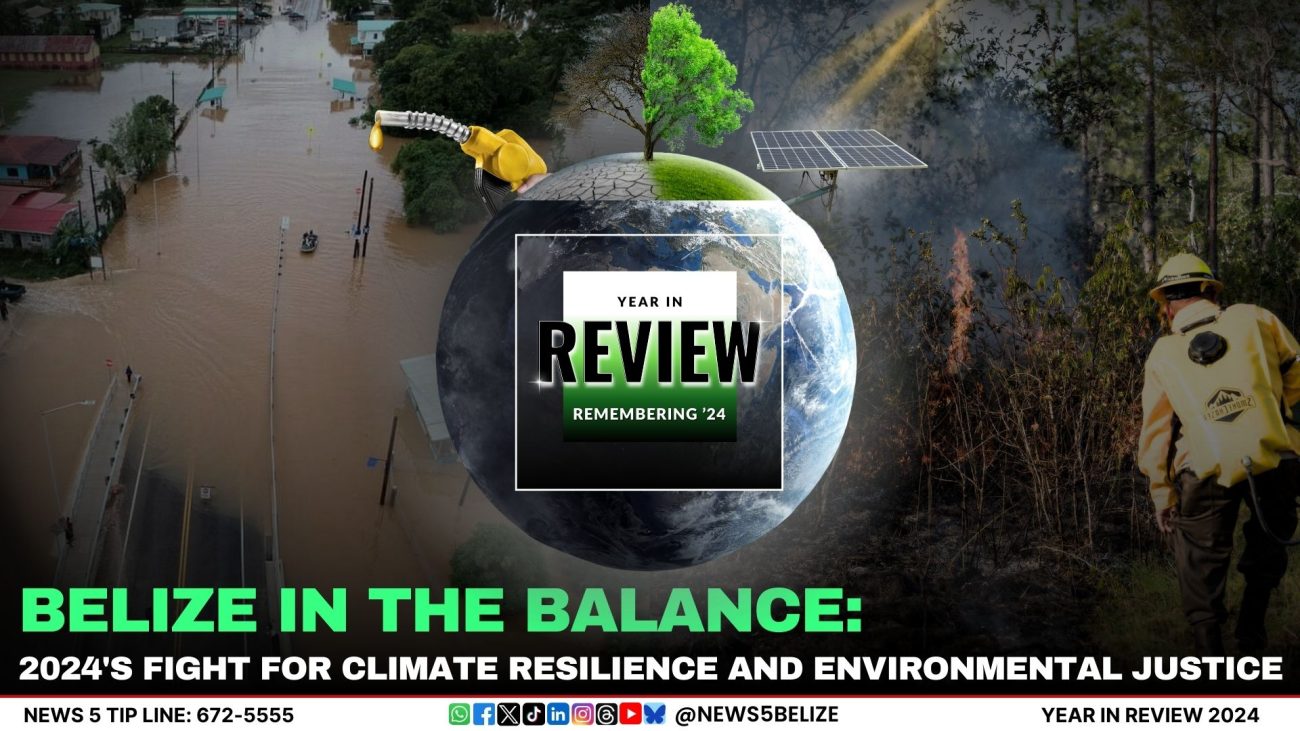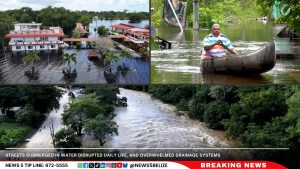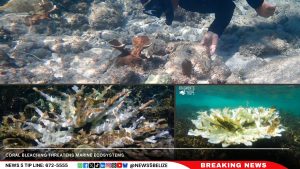Belize in the Balance: 2024’s Fight for Climate Resilience and Environmental Justice
As we wrap up 2024, News 5 is excited to bring you our digital Year in Review! This year, we're diving into the highlights and challenges of the past twelve months, all organized by themes. Join us as we look back at the stories that shaped our year…Belize, a beacon of biodiversity and a champion for climate action, experienced a year of significant challenges and triumphs in 2024. From groundbreaking conservation initiatives to devastating natural disasters, Belize reaffirmed its position as a global leader in environmental stewardship while grappling with the realities of climate change.
Blue Bond Progresses Towards Marine Conservation Milestones
Two years into the revolutionary Blue Bond agreement, Belize demonstrated remarkable progress in marine conservation. Secured in 2021 through a $553 million loan from The Nature Conservancy, the Blue Bond initiative reduced Belize’s debt servicing by $400 million BZD and set ambitious conservation goals. By 2024, Belize had committed over $15 million BZD to marine protection efforts, enhancing biodiversity zones and supporting fisheries management.
Prime Minister John Briceño said, “We have strengthened the management of mangroves, expanded biodiversity protection zones, and launched the Belize Ocean Sustainable Plan.” These efforts include expanding marine protected areas to 25% by the end of 2024, with a goal of 30% by 2026.

Programs such as the Fisher Fund, launched in partnership with local institutions, aim to provide small-scale fishers with financial support to enhance livelihoods while protecting the marine ecosystem. Investments in cutting-edge surveillance technology, such as drones for the Belize Coast Guard, further emphasised the government’s commitment to curbing illegal fishing and ensuring sustainable marine practices.
The government also launched the marine spatial planning process for the Belize Ocean Sustainable Ocean Plan, which will provide a blueprint for blue economy development. This includes strengthening mangrove management and designating national lands within the Belize Barrier Reef Reserve System as mangrove reserves.
The Devastating Impact of Wildfires on Forests and Carbon Markets
2024 witnessed severe wildfires that ravaged over 30,000 acres of pristine forests, including protected areas such as the Rio Bravo Conservation and Management Area. These fires not only destroyed vital biodiversity but also had severe economic consequences, particularly in the carbon credit market. Belize, a leader in carbon offset projects, lost millions in potential revenue as fires undermined the credibility of its carbon reserves.
Jose Perez of the Association of Protected Areas Management Organisations (APAMO) warned of the escalating costs and challenges in combating wildfires, attributing the problem to inadequate funding and delayed responses. Edilberto Romero of the Programme for Belize echoed this concern and said there is the need for a national contingency fund to enable rapid firefighting responses.
Deforestation and Agriculture: A Double-Edged Sword
The clearing of over 640,000 acres of forest since 2001, primarily for agricultural use, has exacerbated Belize’s climate vulnerabilities. While agriculture contributes nearly 20% of the nation’s GDP, the environmental cost is becoming increasingly unsustainable. Farmers reported unprecedented weather fluctuations, such as unexpected floods and prolonged droughts, which damaged crops and disrupted food supply chains.
Ever Blandon, a vegetable farmer in the Valley of Peace, described the economic fallout: “Flooding destroyed cabbage crops ready for harvest, leading to losses for both farmers and consumers.” These realities have prompted calls for sustainable land use policies and stricter deforestation controls.
Minister Orlando Habet advocated for a comprehensive land use policy to balance agricultural development with environmental preservation. “We must adopt sustainable practices and protect forested areas that support biodiversity and regulate the climate,” he urged.
Heat Waves, Flooding, and Urban Resilience
Record-breaking temperatures plagued Belize in 2024, with inland areas experiencing heat waves surpassing 103°F. This extreme heat, coupled with prolonged dry spells, highlighted the escalating impacts of global warming. Simultaneously, heavy rains brought on by tropical storms caused widespread flooding in urban areas, particularly Belize City. Streets submerged in water disrupted daily life, and overwhelmed drainage systems raised questions about infrastructure resilience.
In response, city officials deployed the newly activated pumping station, which mitigated flooding in key areas. Belize City Mayor Bernard Wagner emphasised the shared responsibility of residents and authorities, urging community involvement in maintaining drainage systems to address the growing threat of urban flooding.
Coral Bleaching Threatens Marine Ecosystems
Belize’s coral reefs, the largest in the Western Hemisphere, faced unprecedented threats from bleaching events driven by rising sea temperatures. Coral bleaching occurs when stressed corals expel algae that provide them with colour and nutrients, often leading to death. Organisations like Fragments of Hope spearheaded restoration efforts, planting climate-resilient coral species and maintaining nurseries near Laughing Bird Caye.
Dr. Colin Young, Executive Director of the Caribbean Community Climate Change Centre (CCCCC), warned of the worst-case scenario: the loss of up to 90% of coral reefs worldwide. “Reefs are vital for coastal protection, fisheries, and tourism. Their decline underscores the urgent need to reduce global emissions,” he said.
Belize Leads Climate Advocacy on Global Platforms
Belize’s role as a regional climate leader was evident at COP29 in Azerbaijan, where its delegation, led by Minister Orlando Habet, championed the needs of Small Island Developing States (SIDS). Emphasising the nation’s vulnerabilities, Habet called for expedited climate finance mechanisms, particularly for adaptation and loss-and-damage funding.
Despite securing a $50 million grant from the Green Climate Fund earlier in the year, Belize continued to advocate for more equitable distribution of climate financing. “Our ambitions require $1.7 billion to implement mitigation and adaptation projects by 2030. Without sufficient funding, our commitments remain unattainable,” Habet asserted.
National climate fairs and community outreach programs aimed to bridge the gap between policy and grassroots action. NGOs like the Wildlife Conservation Society introduced nature-based solutions for farmers and fishers, helping communities develop their first-ever climate action plans. Public messaging focused on simple behavioural changes, such as conserving water and reducing waste, to mitigate environmental harm.
2024 reaffirmed Belize’s dual role as a global environmental advocate and a nation on the frontlines of climate change. While significant strides were made in marine conservation and climate financing, the year’s challenges—from wildfires to coral bleaching and extreme weather events—underscored the urgency of scaling up both national and global efforts.
Belize’s commitment to innovative solutions, such as the Blue Bond, offers a blueprint for integrating financial sustainability with environmental conservation. However, the realities of a warming world demand collective action from all nations, particularly those responsible for the bulk of greenhouse gas emissions.
As Belize looks to 2025, its resilience will depend on continued investment in adaptation measures, robust enforcement of environmental laws, and sustained advocacy for climate justice on the world stage.










Facebook Comments